
Following 11 months of relentless hard struggle, 595 public sector cleaners have become the embodiment, the symbol, the soul, the life itself of the most determined resistance against the politics of austerity in Greece. These women have become “political subjects” and the leadership of the current resistance movement in its entirety, having the guts to face up to such powerful enemies as the Greek government, the Central European Bank, the European Commission and the IMF.
For 11 months of struggle, these cleaners have set themselves against the government and the TROIKA and become their main enemy, having short-circuited the implementation of the austerity measures and having a constant presence on the political scene through the mass media. Meanwhile, the opponents of the politics of austerity still treat these fighting cleaners as though they are not political subjects.
From the moment the Troika-imposed austerity measures appeared, the women came out en mass onto the streets, and their resistance displays its own dynamic, with its own specificit rich in political lessons.
In the four years of austerity politics which have transformed Greece into a pile of social, economic and above all human ruins, few amongst us have spoken of the lives of the women and even less about their struggles against the diktats of the TROIKA. It was therefore to be expected that public opinion would be shocked by this exemplary fight, executed exclusively by women. But is this fight really so shocking?
Women have participated en mass in the 26 general strikes. In the “movement of the indignant” they occupied city squares, set out camps, demonstrated. They mobilised at the front line for the occupation and the independent running of ERT. Acting in an exemplary manner, they became the soul of the strike committees of the universities’ admin staff against the “reserve pool” policy, (ie those to be sacked after 8 months, at 75% of their normal salary). 25 000 public servants, majority women, will be the victims of staff cuts in the public services. Women alos form the vast majority of the volunteers in the Solidarity Movement and the self-managed solidarity health structures that are trying to deal with the human crisis and the collapse of health services.
The mass participation of women in the resistance movements against the demolition of the welfare state and against the politics of austerity is not surprising, and it did not happen by accident. First of all, women find themselves at the eye of the austerity storm. The dismantling of the welfare state and of its public services is damaging their lives; forming the majority of the civil servants and of the main users of public services, women are doubly hit by all cuts. They have therefore one thousand reasons not to accept this historic deterioration of their living standards, akin to a return to the 19th century.
It is true that at the beginning women were not differentiated as “women – political subjects”, participating as they were in the same demands and the same forms of action with the men within the various movements. They were simply participating in large numbers.
However, already within the framework of the pioneering struggle against gold extraction at SCOURIES in Chalkidiki, taking on the Canadian multi-national ELDORADO GOLD, the women were rapidly being differentiated through their specific forms of action and their radicalism. The press and popular perceptions ignored the significance of their gender identity in the way they were fighting, but not the police did. Quite the opposite, the MATs (Greece’s special riot control police units) targeted mainly women, using savage and selective measures in order to terrorise the whole population through them and eradicate any form of disobedience and any resistance movement.
Women were imprisoned, legally persecuted, and subjected to violence and humiliation, even “sexual” degradations specifically adjusted to their bodies and their gender.
In the following year women took more initiatives and developed their own forms of action.
It all started when, in order to implement the harshest part of the austerity program and comply with the terms imposed on it by the “lenders”, the government targeted, in advance of anybody else, the cleaners at the Ministry of Economic Development, the Inland Revenue and the Customs offices. It placed them on “reserve lists” since last August (which means that for 8 months they would be paid only three-quarters of their salary of 550 Euros per month, and then be sacked).
The government followed the same tactics as in SCOURIES. It started by targeting the weakest and those with the least chance of getting support, ie the cleaners, to be followed by the bulk of the employees, the 25,000 civil servants to be made redundant. And it was timed at the moment when the resistance movement was getting exhausted after the relentless austerity measures, with many activists getting demoralised, depleted and forced to try and solve their own problems individually.
The government believed that, with this group of workers, ie poor women, of “lower class”, pay levels around 500 euros per month and, as they assumed, not very intelligent (which explains the origin of the cleaners’ slogan “we are cleaners, not idiots”), they could sort them out quickly and squash them like worms.
The target was to privatise cleaning work as a gift to the private cleaning contractors. These mafia-like contractors, known as tax-evasion champions, would then re-employ them at c200euros per month (ie 2 Euros an hour), with almost non-existent security and no employment protection rights, practically equivalent to slave labour.
These women, sacked from their jobs, sacrificed to the man-eating tendencies of the TROIKA, these women of 45 to 57 years of age, many mothers in single parent households, divorcees, widows, over-indebted, with children, unemployed husbands, or caring for disabled dependants, with no access to “early” pensions after 20 years, and without a chance of finding another job, decided not to give in. They decided to take control of their lives in their own hands.
And so we’ve got a handful of women who decided to change the established forms of action adopted by the traditional trade unions. Some have taken the initiative and organised themselves for themselves, with a group of cleaners at their core, who had already fought battles 10 years ago and won significant victories. They have worked hard and they have woven a web that has acquired national dimensions.
(Photo Credit: CADTM.org)
 The women cleaners of the Ministry of finance in Athens
The women cleaners of the Ministry of finance in Athens